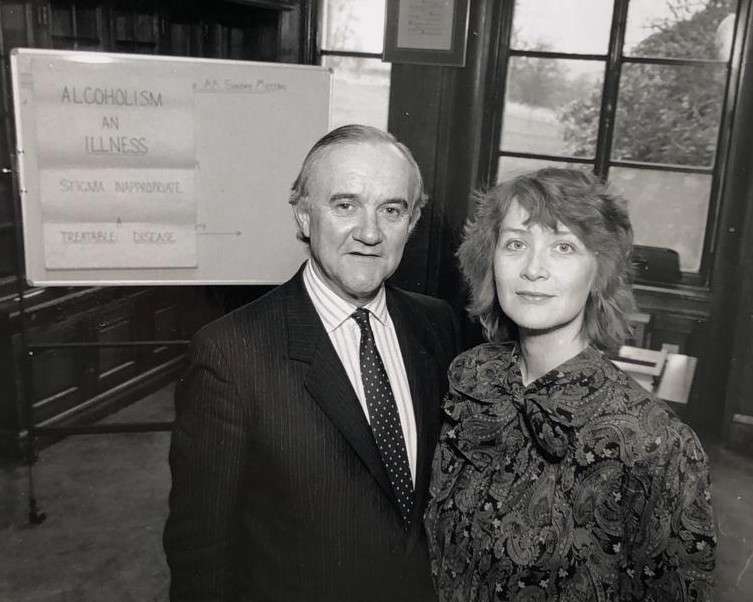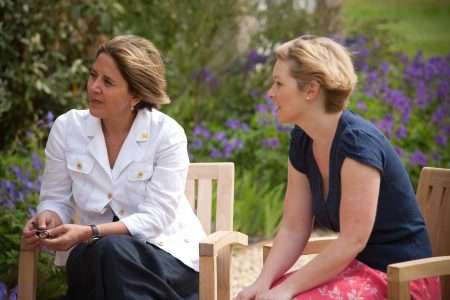Almost 40 years ago, Peter McCann and his wife, Dr Margaret Ann McCann, began helping people with drug and alcohol addiction into a life of recovery. This eventually led to the founding of Castle Craig Hospital in 1988. As he celebrates his 80th birthday having spent half of his lifetime helping people overcome addiction, we asked Peter to look back on his own life, and the changing face of addiction treatment.
A genuine understanding of addiction
Peter’s passion for helping people overcome addiction came from his own experience, along with coming from a family with a medical background.
“It was from my own recovery – and having been brought up in a professional medical family myself, I was motivated from an early age to be wanting to care for people. Not being a doctor as such, I very fortunately married a doctor and with her medical skills and my business skills and finance knowledge, the combination of the two made an ideal partnership.
“I was a bit of a playboy when I was younger, drinking a lot, so when I was younger the thoughts of recovery were totally alien to me. It took the difficulties of going through the early recovery stages in order for me to develop an insight into what was needed and how one could help that. For me that came through the involvement of Alcoholics Anonymous; I’m very fortunate in having had some very good mentors indeed there and they were very supportive.
“Two of my most important influences were my original sponsor in Alcoholics Anonymous and his wife – Trevor and Mairi Oliver. She used to run the London telephone service for AA and I used to volunteer and take the telephone there at regular times, and that was a wonderful experience because I was talking to sick alcoholics on the phone and meeting up with them and taking them to meetings and that was a very useful background for me for later on in life.
“The ability to work with people – who encouraged us a lot – has been a big influence and in fact it was Mairi Oliver who introduced me to Margaret Ann, who obviously is my biggest influence.”
Scotland’s first 12 Step rehabilitation clinic
Peter and Margaret Ann founded Castle Craig five years after founding Clouds House, and realising a need to build a larger centre to treat addiction in Scotland.
“I’d been very impressed to see people coming to AA meetings who had been to treatment centres in the States and we wanted to bring those kind of treatment outcomes to the UK.”
“So we set up Clouds House and, with very very limited charitable funds we were able to get that up and running and it gradually, over a couple of years, got a very fine reputation. After four of five years there we decided we wanted to move and establish our own centre, because we were rather constrained by factors including the size of the property.
“So a choice was made to move to Scotland – where my family had originally come from – and after a lot of hunting we discovered Castle Craig, which we purchased from Strathclyde regional Council.
“The property happened to be available at the right time – ideally situated and able to be converted to a treatment centre with all the facilities, in wonderful surroundings, and close to big centres like Edinburgh and Glasgow.
“There we were – 50 acres, with an empty building and empty coach houses and other buildings on the site, and we started a room at a time – we furnished a room, filled that with patients and did the same to the next room and gradually built up a good team of staff, nurses and therapists.
“Gradually we ended up with about 120 beds – both the main clinic and what is now the extended care unit, so it has been very good indeed.”
Changes in NHS funding and expansion to Ireland
“We were very fortunate – particular in the early days – to get a lot of patients from the NHS, particularly Glasgow, up until the turn of the century. It’s rather changed now – there’s more emphasis on care in the community which is regrettable, because many of the patients who came to us weren’t really suited to that.
“Now we have a complete cross-section of patients. We have patients coming from the Netherlands, insurance-funded patients, and private cases.
“We branched out and opened a clinic in Ireland – Smarmore Castle – and really did that because, knowing we were going to be leaving the European Union, I wanted to retain a foothold in the European Union, which is operating successfully”.
“We’re very fortunate in having Professor Jonathan Chick as our Medical Director – who took over from Dr McCann after she had had the position for many years. he is a world-renowned addictionologist and it’s very good to have his input here.”
How knowledge of addiction has changed in the past 40 years.
“People used to believe that when you went out on a drinking binge, you destroyed several billion brain cells and they were gone forever, but that changed about 20 years ago – that ‘accepted wisdom’ was proved to be totally wrong, and that brain cells could actually regenerate.
“You had to meet several conditions to heal your brain – the very first one of course is to stop drinking or using drugs – and then things like a good, healthy diet, lots of exercise and meditation, all the things one can get in a good residential treatment programme – are all necessary for the brain to regenerate. And that takes time – it can’t be done in five minutes.
“They used to say in AA ‘don’t make any major decisions for the first couple of years in recovery.’ They didn’t know why they said that, but the reason was through experience – people made mad decisions in their early recovery because of the brain damage, and it takes a couple of years for that to heal and rational thought to prevail.
“Really, unless those conditions can be provided in an outpatient setting – which, for many people, that’s impossible – it shows how important residential care is if there’s going to be brain recovery.
“The very latest research – just out last year – says that after someone stops drinking, the brain carries on being damaged for the next six weeks so that if someone has a short period of treatment – say four weeks, it means that you’re leaving treatment and the brain carries on being damaged and of course and that leads to a higher relapse rate. So these messages must be taken on by the treatment community – and by the people who fund the treatment community – because if you want to have a good success rate you’ve got to repair the brain, and you’ve got to have the conditions right for that.
Treating trauma and addiction together
“There are a lot of mental health issues which are there as a result of addiction and that’s why a well set up treatment centre like Castle Craig and Smarmore can handle comorbidity and dual diagnosis cases, looking at the mental health issues and the addiction issues. This should be done at the same time and in a lot of countries this isn’t – Ireland being an example – where it’s very difficult to get this joined-up treatment but which we are providing at Smarmore in Ireland, as well as Castle Craig in Scotland.
“Unfortunately at the moment [with the coronavirus pandemic] it’s very difficult to maintain services but we must manage through until this virus is conquered, because we know there is going to be a big demand because many people are very unsettled – especially those in early recovery. So very regrettably, we think a lot of people will have very serious difficulties and will be needing help in the not-too-distant future.
“In the aftermath, a lot of people will get post-traumatic stress disorder and have to be treated for their trauma, for example when they’ve had relatives dying and not being able to say goodbye to them – all these are very difficult situations.
“But if there’s an addiction issue there, of course we can help and we can treat PTSD together with addiction – we’ve got specialist therapists who can help that.
“There’s a lot of work to do.”
Thanks to the team and the treatments Peter has worked hard to build up over the years, that work can continue for many years to come. So if you’re struggling with addiction, or you know someone that is, please get in touch because – as always – we’re here to help you.



